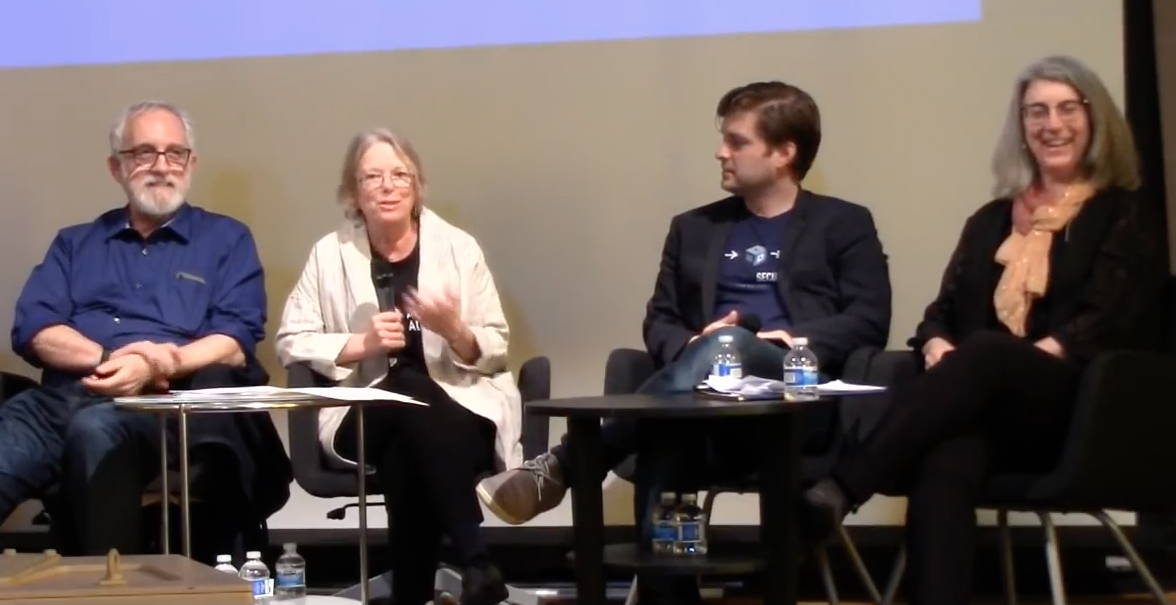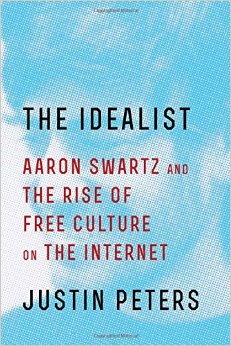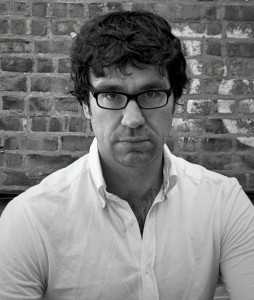
This is from April 7, 2018. Complete transcription and video available here at the Internet Archive. (A complete index of all speakers is forming here on the Aaron Swartz Day website.)
Cindy Cohn: [01:16:30] Our next speaker is EFF current board member Pam Samuelson. Pam is the Richard M. Sherman Distinguished Professor of Law at the Berkeley Law School and co-director of the Berkeley Center for Law and Technology. She’s been a member of the Board of Directors of EFF since 2000, and is proud to have succeeded John Perry Barlow as the Vice Chair of that Board. Although Barlow did make us give him another role which was the Rockin Vice Chair. I think it’s the Rocking Chair. Yeah, sorry about that.
She is also co-founder and chair of the Board of the Authors Alliance, a Non-profit Organization that represents the interests of authors like Barlow who want their work to be more widely available and who want to take advantage of opportunities to share their work in digital networked environments. Her most Barlowesque writing was “The Copyright Grab,” published by Wired, in January 1996. Now I’m going to try to riff Cory a little bit. Cory wanted to point out that the Internet has these natural pairings between kind of what Cory called “loony-ass visionary types” and serious, incredibly well-informed, sober, razor sharp adult supervision. (Often, women.) [01:18:12]
And I certainly inherited your role (looking over at Mitch Kapor) as the hyperbolectomy person for John Perry and as Cory points out those pairings are frequently devastating to our audience. You line them up Barlow and we’ll knock them down with the logic. I think the original one of these pairings was Pam Samuelson and John Perry Barlow on the question of copyright and the Internet. Pam?
Pam Samuelson: So, as requested. I will start with a quote that I really like from John Perry Barlow. “Think of the net as an ecosystem. It is a great rain forest of lifeforms. Ideas, which like organisms, these patterns of cells for reproducing, evolving, adaptive information that express themselves, and schemes of carbon, require other organized organisms to exist. Imagine the challenge of trying to write a song if you’ve never heard one. As in biology. what has lived before becomes the compost for what will live next. Moreover, when you borrow or for that matter, “steal” an idea that first took form in my head, it remains where it grew, and you, in no way, lessen its value by sharing it. On the contrary, my idea becomes more valuable, since in the informational space between your interpretation of it and mine, new species can grow. The more such spaces exists, the more fertile is the larger ecology of mind. [01:19:47]
So, Barlow’s major contribution in the field of copyright. And, he really did.Was “The Economy of Ideas” article that was published in 1994 in Wired magazine. And honestly, it’s been cited 742 times in the law review literature. Which, I’m telling you; there are people in my field who would just die to get that many citations, ok? So, Barlow made an impact on my field, but the wider impact of that article was really to galvanize a lot of people in the community who kind of came to understand that copyright – this obscure thing that we didn’t really like to think about – actually had some impact on our lives especially on the Internet. [01:20:40]
So, I wanted to spend most of my time talking about a conference that I was at, in Amsterdam, in the summer of 1996. And one of the keynotes of that conference was John Perry Barlow and consistent with “The Economy of Ideas” article, he started talking about the vision of the digital future as digital information was vaporous cargo, which exists either as a pure thought or something like thought, voltage conditions, darting around the net at the speed of light. Copyright might have made sense to thrive in the analog world, because Gutenberg notwithstanding, it was still hard to make a book. But copyright in the digital era, he thought, just didn’t work at all. [01:21:35]
And he spoke of efforts to keep the sinking ship of copyright afloat as taking three forms:
(1) A frenzy of deckchair rearrangement.
(2) Stern warnings to the passengers that if she goes down they will face harsh criminal penalties.
and
(3) Serene glassy eyed denial.
The other keynote speaker at this particular conference was Bruce Lehman, who was, at the time, the Head of the Patent and Trademark Office, and the Chief Intellectual Property Officer for the Clinton Administration. And he had just published this white paper on intellectual property and on the Internet, in which every temporary as well as permanent copy of any copyrighted work anywhere had to have permission in order for those digital copies to be made. An ISP should be strictly liable for every infringement of users, they would have a responsibility to monitor everything in everybody’s files, in order to make sure that there was no infringement, and everything was going to be a locked up. There was not going to be any fair use anymore. We don’t need fair use, because everything can be licensed. And this kind of heavily proprietary really really locked down everything approach was scary because this guy was the head of the government in charge of this particular policy. OK? [01:23:02]
So what we needed was a poet to galvanize and to make us all really understand and appreciate what was an alternate future to that which Bruce Lehman was setting out for laymen. Barlow was a dangerous charismatic anti-Christ. And for Barlow, Lehman was the captain of the ship that was sinking, of copyright, and so having these two people go at it was really one of the things to really remember.
Now it’s important actually that John Perry Barlow’s essay about this new economy, and the speeches that he gave, really did galvanize a lot of organizations and a lot of people, to become copyright activists. And I think that was a really important thing. Part of why was so different was that civil liberties organizations typically have thought “Oh copyright doesn’t matter, it’s a business law subject. It doesn’t have anything to do with us. And Barlow really got that copyright had a civil liberty dimension that we all really needed to appreciate, and we needed to make our voices about what copyright should do available to the world. [01:24:24]
So a favorite passage that I have from him about that is:
“When the primary articles of commerce and society look so much like speech as to be indistinguishable from it. And when the traditional methods of protecting ownership have become ineffectual attending to the problem with broader and more vigorous enforcement will inevitably threaten Freedom of Speech. The greatest constraint on your future liberties may come not from the government, but from the corporate legal departments laboring to protect, by force, what can no longer be protected by practical efficiency or by social consent.”
I think these kinds of words really inspired those of us connected with EFF, to really go out there and defend fair use. To defend our Freedom of Expression. To push for policies that were much less awful than the policies of Bruce Lehman was going for and if you think that copyright isn’t in too bad shape today, it’s partly because that galvanizing, which Barlow was part and parcel of, really worked. [01:25:32]
And the positive values of sharing have inspired so many other organizations, and I think it’s important to say: Many of you out there use Creative Commons licences, you enjoy the sharing of content, and John Perry was there at the launch of Creative Commons and it is now global and millions and millions of people use it, and it’s part of his legacy too.
So thank you and let’s celebrate his life.

